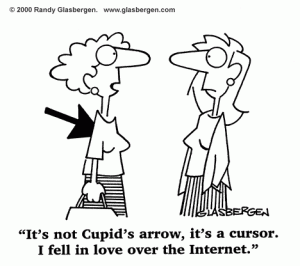Click Me Honey, I’m Yours
by: Kenya Lee
This is no longer high school; your knees don’t buckle when the crush that you’ve liked for ages walks by. Today, your heart skips a beat and you smile when you open your laptop and read that a ‘new single in your area’ believes that the world relies too heavily on fossil fuels, enjoys listening to smooth jazz, and prefers cats over dogs. Bingo. He or she might be the one. According to studies by the University of Texas and The University of California, people are significantly more attracted to people who share similar beliefs and values.
In a study by UT faculty that involved 168 adult subjects it was found that when subjects were shown attitude scales of two anonymous subjects, the subjects were significantly more attracted to the anonymous subject with similar beliefs. When the data was plotted there was a positive association between similarity and attraction. Meaning, the more similarities, the more likely the subjects would be attracted. The data from this 1968 study is now used for compatibility profiles for popular dating websites like EHarmony. The website is very unlikely to ‘match’ users who have very polar beliefs.

Glen Buckwalter, former professor at the University of California and the creator of eHarmony’s compatibility profile stated: “It’s just much easier for people to relate if they don’t have to negotiate a lot of differences. If you have someone who’s Type A and real hard charging, put them with someone else like that. It’s just much easier for people to relate if they don’t have to negotiate all these differences.”
Buckwalter’s algorithm matches users on 29 core traits including social style and emotional temperament. The algorithm is comprised of a 436 question personality test that asks users about humor, curiosity, passion and intellect.
Similarly, search engineer Joseph Essa is developing new technology to analyze user online behavior, in hopes of matching people based on behavioral patterns.
A study at the University of California administered personality tests to 5,000 married couples. The couples were then asked about marital happiness. It was found that happier couples had closer scores on the personality test than couples who claimed unhappiness. Are these compatibility similarities why EHarmony boasts 118-287 marriages from their matches daily? Perhaps.
Further research from Arizona State University found that once marriages or long-term relationships begin, it is important to use ‘couple words.’ They found that couples who used words like: “we, our, and us” as opposed to “I, me, and my” were generally more satisfied with the relationship. Those who were frequently intimate and had similar financial patterns also had happier relationships.
Taken together, these studies suggest that strong relationships involves a combination of shared beliefs and
Works Cited:
D, Byrne, and Nelson D. “Result Filters.” US National Insitute of Health. U.S. National Library of Medicine, n.d. Web. Dec. 2014. <http://www.ncbi.nlm.nih.gov/pubmed/14300244>.
DOI: 14300244